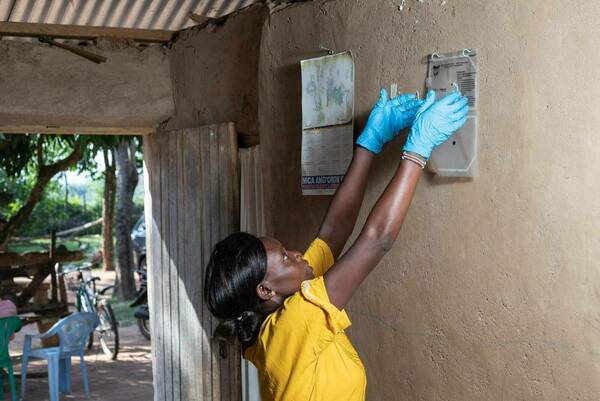White Group Publishes a New Method to Identify pH-dependent Cell Process Pathways

Small changes in intracellular pH (pHi) regulate normal cell behaviors such as cell movement, cell division, and differentiation to ensure that biological processes occur normally, but dysregulation of pHi has been implicated in diseases such as cancer and neurodegeneration. Therefore, determining the nature and mechanisms of pHi dysregulation is an important step in developing better treatment options for these diseases.
At a molecular scale, pH-dependent biological processes are mediated by proteins, called pH sensors, that respond to small changes in pHi. Traditionally, identifying pH sensors and pHi-sensitive pathways has taken a reverse approach, starting with a biological outcome and then working backward to identify essential pathways, followed by determining individual proteins with pHi-sensitive functions. Testing each pathway and protein one by one is an extremely labor- and time-intensive process. Thus, a comprehensive molecular understanding of how pHi changes cell behaviors has been elusive.
A new paper from the laboratory of Katharine White, Clare Boothe Luce Assistant Professor in the Department of Chemistry and Biochemistry, published in the Journal of Biological Chemistry (2024, vol. 300, article 107658) reports an experimental platform that addresses this challenge through a more efficient method to determine the molecular mechanisms driving pHi-dependent cellular processes. Using an -omics based approach on normal human breast epithelial cells, White was able to identify thousands of genes that were regulated by pHi in a vastly reduced time relative to previous methods.
After narrowing the focus to a smaller subset of genes (176) that exhibited increased or decreased expression due to changes in pHi, the White Lab discovered that the genes clustered in a small number of cellular pathways including signaling and metabolic pathways. They showed that changing pHi could alter cell signaling and metabolism and discovered that, importantly, increasing pHi in normal breast epithelial cells drove them to become more cancer-like. At high pHi, the normal cells increased activity of a signaling pathway called Notch, that leads to cell overgrowth and is associated with tumor formation. When pHi was raised in the normal breast cells, they showed a metabolic signature called Warburg metabolism that is found in patient cancers.
Speaking about the findings, White said: “One of the biggest challenges for researchers is how to specifically target diseased cells while leaving normal cells unaffected. Our work shows which pHi-dependent pathways may be good therapeutic targets for more selective and effective treatments.”
This research imparts important advances in the molecular understanding of how dynamic pHi regulates normal biological responses. It identifies appropriate pathways to investigate for therapeutic targeting of pHi in cancer and neurodegeneration, opening the door for more effective disease treatment.
Originally published by at chemistry.nd.edu on November 11, 2024.
Latest Research
- NSF Cyber SMART’s fall meeting shapes fifth year of project, legacy and future plans, and adds new memberThe U.S. National Science Foundation (NSF) Cyber SMART center gathered for its fall meeting on the University of Notre Dame campus this September. The meeting served as a checkpoint with progress reports and new projects from research leads and students…
- Slavic and Eurasian studies professor wins Humboldt fellowship to research how Russia’s religious past shapes its presentWhen Russia invaded Ukraine on Feb. 24, 2022, Sean Griffin realized his second book needed a new title. Griffin, an associate professor in the University of Notre Dame’s Department of…
- Notre Dame’s R.I.S.E. AI Conference builds interdisciplinary collaboration to inform human-centered artificial intelligenceAs artificial intelligence (AI) transforms nearly every sector of society — from healthcare and education to governance and global development — a critical question emerges: How can we conscientiously design and deploy these powerful technologies to positively impact society? This…
- University of Notre Dame joins the Global Coalition of Ukrainian StudiesThe University of Notre Dame has joined the Global Coalition of Ukrainian Studies after signing a Memorandum of Cooperation (MOC), formalized on September 24, 2025, at the Ukrainian Institute of America in New York City. Notre Dame joined four other American…
- The University of Notre Dame’s Mendoza College of Business and Industry Labs team up to inspire national security manufacturing competitiveness in the regionThe South Bend - Elkhart Region is full of manufacturing companies that are poised to grow, and Executive Master of Business Administration (EMBA) and Master of Business Administration (MBA) students at the University of Notre Dame are finding innovative ways to contribute to that growth. Earlier…
- Notre Dame research informs WHO conditional recommendation for spatial repellents in malaria vector controlThe World Health Organization (WHO) recently announced a “conditional recommendation” for spatial emanators, also known as “spatial repellents,” in the fight against malaria. This key determination was informed by spatial repellent studies that included the Advancing Evidence for the Global Implementation of Spatial Repellents (AEGIS) Project in Kenya, led by the University of Notre Dame and funded by Unitaid. The findings from this particular study were recently published in The Lancet.













